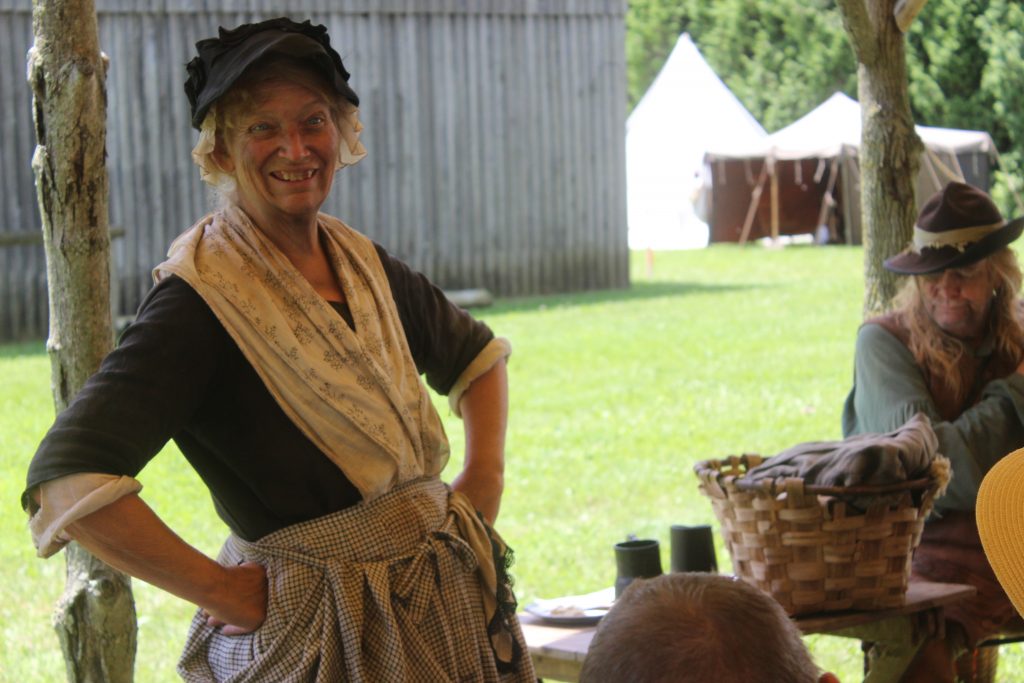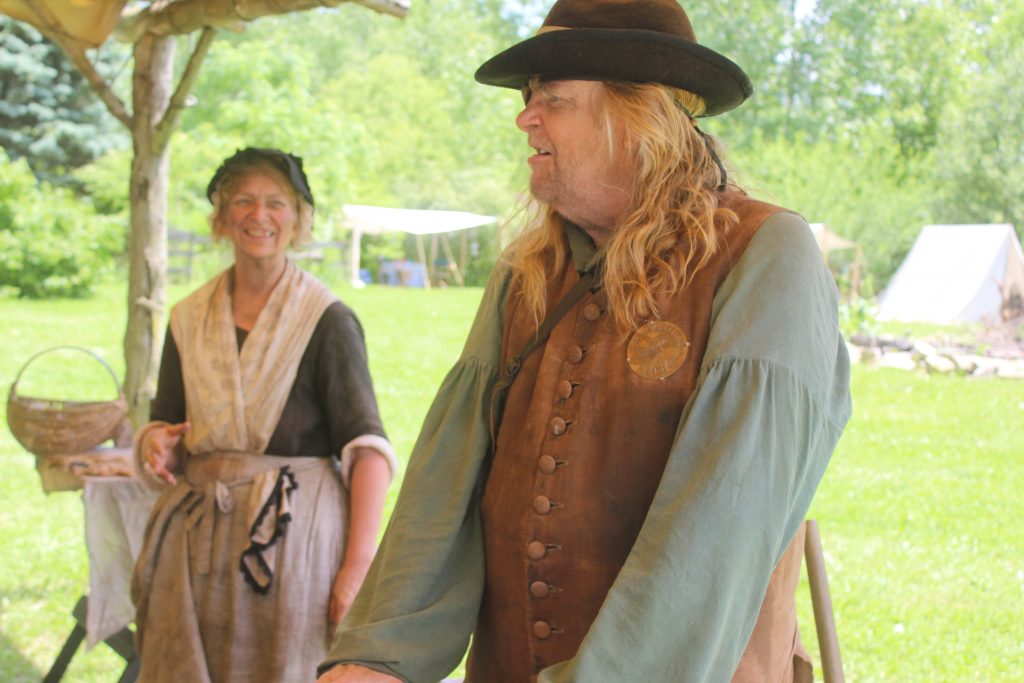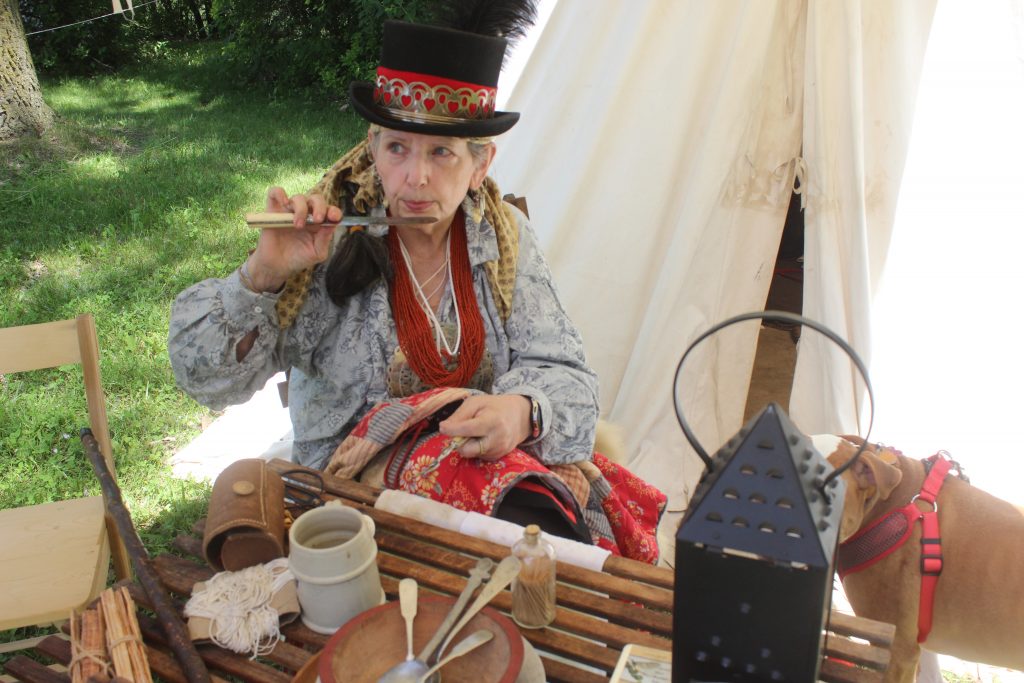By DAVID DUPONT
BG Independent News
Some call them body snatchers.
Others call them ghouls.
But Maggie and Ould Badger prefer to be called Resurrectionists. Theirs, Maggie says, is a “noble profession.”
For hundreds of years they provided the bodies needed for doctors and medical students to study anatomy. That’s a benefit for everyone who needs medical treatment.
“Such a noble job,” Maggie said. “We do it because we have such caring hearts for our fellow humans.”

Maggie and Ould Badger — Carol and Frank Jarboe as they’re known nowadays in Woodburn, Kentucky — conducted their trade in colonial Philadelphia. While Ould Badger led the gang that did the digging and selling, Maggie, a professional mourner, provided intelligence on likely targets. Her reward was the hair and front teeth, especially the eye-teeth — of the corpse. These she sold to wig makers and dentists.
The Resurrectionists told their story at the Old Northwest Primitive Rendezvous Saturday at Seven Eagles Historical Education Center, Grand Rapids. The rendezvous is open to the public through Thursday from 10 a.m. to 4 p.m. each day. A few dozen tents are set up with re-enactors demonstrating the ways and telling the stories of colonial times.
Maggie and Ould Badger visited on Saturday. The setting was an old tavern where, Vicki Johnson, the event leader said: “You would never know what kind of strange characters would show up.”
With that Maggie arrives singing the ballad, “Out of the Ground and Sold Away.”
Maggie has a back story that’s been presented in previous years. She’s an indentured servant who came with her family to America after being driven off their land in Ireland. In America she found hardship, and an elusive promise of freedom. Her term kept getting extended for trying to run away or for other misbehavior.
Then she was sold to a parson — “he was a good man, mostly, for a preacher.”
She warned him his singing was more like braying, Still while leading a funeral procession the spirit moved him to lift his voice in an old hymn.
He spooked the black horses pulling the hearse and they trampled him.
Dying in his bed, he ordered Maggie to be freed because as he told her: “I wouldn’t wish you on anyone else with your tongue and Irish ways.”

Now she’s found her way to Philadelphia where she’s partnered up with Ould Badger, a rascal, who is deadly serious about his trade.
He explained in detail — with Maggie providing translation since he has no tongue — how one goes about slipping the body from the grave, making sure the burial plot is left to look undisturbed.
All they take is the naked corpse itself because a dead body belongs to no one.
Grave robbers took valuables that may be buried with a corpse, and that was punished more severely than taking the body.
Still friends and relatives would be outraged and would go after the Resurrectionists ready to render their own justice at the end of a rope.
A body would fetch 12 pounds — almost a year’s salary for an average worker.
A skilled crew could extract six or eight bodies in a night.
It just so happens that Ould Badger had an opening for a good man on his crew. Seems Lucky, one of his men, had violated one of the cardinal rules of the trade, and showed up to work drunk. He fell in the hole and broke his neck. Not so lucky, Ould Badger chortled. He was not so choked up about Lucky’s death, given it meant he had another body to deliver to the doctor.
Some measures were taken to protect newly buried bodies. Armed guards would be hired to deter the Resurrectionists. This was the graveyard shift.
Or the bodies would have iron collars around their necks to prevent them from being easily slipped out of the coffins.
Or more extreme, explosives would be planted. Not only would this pose a danger to the Resurrectionists, but also doctors didn’t wanted bodies already in pieces.
After the presentation, Frank Jarboe said most Resurrectionists worked through a middle man. Back when Harvard Medical School had just started, one of the founders John Warren worked with the son of Paul Revere, John Revere, to procure bodies.
The reason the medical school moved across the Charles River to Boston, Jarboe said, was because there were not enough corpses to be had in Cambridge, Massachusetts.
This practice continued well into the 20th century, Carol Jarboe said. And she’s heard it may still be going on.
Carol Jarboe teaches literature, and while doing research she came across a couple lines that referred to the Resurrectionists. That provided her with the second chapter of Maggie’s life. She said she is at work on a third chapter, which may involved her being reunited with the two children she was separated from when her family arrived in America.
She would say no more. Though she told a woman who said the earlier story about Maggie had moved her to tears that this new forthcoming one may have the same emotional effect.


